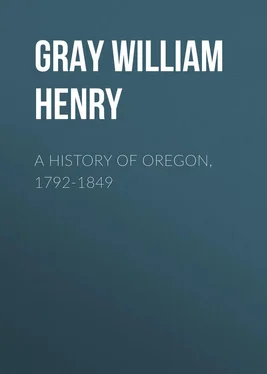William Gray - A History of Oregon, 1792-1849
Здесь есть возможность читать онлайн «William Gray - A History of Oregon, 1792-1849» — ознакомительный отрывок электронной книги совершенно бесплатно, а после прочтения отрывка купить полную версию. В некоторых случаях можно слушать аудио, скачать через торрент в формате fb2 и присутствует краткое содержание. Жанр: literature_19, foreign_antique, foreign_prose, Историческая проза, на английском языке. Описание произведения, (предисловие) а так же отзывы посетителей доступны на портале библиотеки ЛибКат.
- Название:A History of Oregon, 1792-1849
- Автор:
- Жанр:
- Год:неизвестен
- ISBN:нет данных
- Рейтинг книги:5 / 5. Голосов: 1
-
Избранное:Добавить в избранное
- Отзывы:
-
Ваша оценка:
- 100
- 1
- 2
- 3
- 4
- 5
A History of Oregon, 1792-1849: краткое содержание, описание и аннотация
Предлагаем к чтению аннотацию, описание, краткое содержание или предисловие (зависит от того, что написал сам автор книги «A History of Oregon, 1792-1849»). Если вы не нашли необходимую информацию о книге — напишите в комментариях, мы постараемся отыскать её.
A History of Oregon, 1792-1849 — читать онлайн ознакомительный отрывок
Ниже представлен текст книги, разбитый по страницам. Система сохранения места последней прочитанной страницы, позволяет с удобством читать онлайн бесплатно книгу «A History of Oregon, 1792-1849», без необходимости каждый раз заново искать на чём Вы остановились. Поставьте закладку, и сможете в любой момент перейти на страницу, на которой закончили чтение.
Интервал:
Закладка:
Then we had three distinct organizations in the country: The first, and the most important in wealth and influence, was the Hudson’s Bay Company’s traders; the second, the Methodist Mission, with their ideas and efforts to Christianize the savages, and to do what they could to convert the gentlemen of the Hudson’s Bay Company from the error of their ways; third, the mission of the American Board, to accomplish the same object. The fact of these two missions being in the country, both having the same object to accomplish, elicited a discussion as to the proper location for both to operate in. It was not deemed advisable to locate in the same tribe, as the field was large enough for both. The Cowlitz and Puget Sound district was proposed, but not favored by the Hudson’s Bay Company; Mr. Pambrun kept the claims of the Nez Percés and Cayuses before the party. His interests and arguments prevailed.
CHAPTER XX
Settlers in 1836. – Wallamet Cattle Company. – What good have the missionaries done? – Rev. J. Lee and party. – The Hudson’s Bay Company recommend the Wallamet. – Missionaries not dependent on the company. – Rev. S. Parker arrives at Vancouver.
There were in the country, in the winter of 1836, besides those connected with the Hudson’s Bay Company and the missions, about fifteen men, all told. The two missions numbered seven men and two women, making the American population about twenty-five persons. To bring the outsiders from the Hudson’s Bay Company and the two missions into subjection, and to keep them under proper control, it was necessary to use all the influence the Methodist Mission had. They, as a matter of interest and policy, furnished to such as showed a meek and humble disposition, labor, and such means as they could spare from their stores, and encouraged them to marry the native women they might have, or be disposed to take, and become settlers about the mission. Such as were not disposed to submit to the government of the mission, or the Hudson’s Bay Company, like Mr. E. Young, Carmichael, and Killmer, were “ left out in the cold .” They could get no supplies, and no employment. They were literally outcasts from society, and considered as outlaws and intruders in the country. All seemed anxious to get rid of them.
McCarty, the companion of Mr. Young from California to Oregon, had fallen out with him on the way, as Young was bringing to the country a band of California horses (brood mares). McCarty, it seems, to be avenged on Young, reported to Dr. McLaughlin and the mission that Young had stolen his band of horses (though it has since been stated upon good authority that such was not the case); still McCarty was (I understand) a member of the class-meeting, on probation. His statements were received as truth, and Young suffered. Young was a stirring, ambitious man; he had spent some time in the Rocky Mountains, and in Santa Fé and California, and the little property he could get he had invested in horses, and brought them to Oregon. This fact, with the malicious reports circulated about him, made him an object of suspicion and contempt on the part of the Hudson’s Bay Company and the mission. We find that Mr. Lee treated Mr. Young as an honest man, and, consequently, fell under the displeasure of Dr. McLaughlin and the Hudson’s Bay Company. With Mr. Young, Mr. Lee succeeded in getting up the first cattle company, and gave the first blow toward breaking up the despotism and power of the company. Mr. Young, as Mr. Lee informed us, was the only man in the country he could rely upon, in carrying out his plan to supply the settlement with cattle. He was aware of the stories in circulation about him, and of the want of confidence in him in the mission and among the French-Canadians and Hudson’s Bay Company. To obviate this difficulty, he suggested that Mr. P. L. Edwards, a member of the mission, should go as treasurer of the company, and Mr. Young as captain. This brought harmony into the arrangement, and a ready subscription to the stock of the Wallamet Cattle Company, all being anxious to obtain cattle. But few of the settlers had any means at command. Many of the discharged servants of the Hudson’s Bay Company had credit on their books. There were outside men enough in the country willing to volunteer to go for the cattle, and receive their pay in cattle when they arrived with the band in Oregon. This brought the matter directly to the Hudson’s Bay Company, and to Dr. McLaughlin. Rev. Jason Lee received the orders of the company’s servants, went to Vancouver, and learned from the clerks in the office the amounts due the drawers, then went to the Doctor, and insisted that certain amounts should be paid on those orders.
The Doctor very reluctantly consented to allow the money or drafts to be paid. This amount, with all the mission and settlers could raise, would still have been too small to justify the party in starting, but W. A. Slacum, Esq., of the United States navy, being on a visit to the country, Mr. Lee stated the condition of matters to him. Mr. Slacum at once subscribed the requisite stock, and advanced all the money the mission wished on their stock, taking mission drafts on their Board, and gave a free passage to California for the whole party. (As the missionaries would say, “Bless God for brother Slacum’s providential arrival among us.”) Uncle Sam had the right man in the right place that time. It was but a little that he did; yet that little, what mighty results have grown out of it!
On the 19th of January, 1837, six days after Mr. Young had given up his projected distillery, he is on board Mr. Slacum’s brig Lariat , lying off the mouth of the Wallamet River, and on his way to California with a company of stout-hearted men, eight (I think) in all, not to steal horses or cheat the miserable savages, and equally miserable settlers, out of their little productive labor, but to bring a band of cattle to benefit the whole country. In this connection, I could not do justice to all without quoting a paragraph which I find in Rev. G. Hines’ history of the Oregon missions. He says: —
“Mr. Slacum’s vessel left the Columbia River about the first of February, and arrived safely in the bay of San Francisco, on the coast of California. The cattle company proceeded immediately to purchase a large band of cattle and a number of horses, with which they started for Oregon. In crossing a range of mountains (Rogue River Mountains), they were attacked by the rascally Indians, and a number of their cattle were killed, but they at length succeeded in driving back their foe and saving the remainder. Contrary to the predictions and wishes of the members of the Hudson’s Bay Company , who INDIRECTLY OPPOSED them at the outset, they arrived in safety in the Wallamet Valley with six hundred head of cattle, and distributed them among the settlers, according to the provisions of the compact. This successful enterprise, which laid the foundation for a rapid accumulation of wealth by the settlers, was mainly accomplished through the energy and perseverance of Rev. Jason Lee.”
What good have the missionaries done in the country? I do not know how Mr. Hines arrived at the conclusion that the Hudson’s Bay Company “ indirectly opposed ” this cattle expedition. I know they did it directly , and it was only through the influence of Rev. J. Lee, and Mr. Slacum, of the United States navy, that they could have succeeded at all. Mr. Lee, in his conversation with Dr. McLaughlin, told that gentleman directly that it was of no use for the company to oppose the expedition any more; the party was made up, and the men were on the way, and the cattle would come as per engagement, unless the men were lost at sea. The Hudson’s Bay Company yielded the point only on the failure of the Rogue River Indians to destroy the expedition. Mr. Slacum placed it beyond their control to stop it. The courage of the men was superior to the company’s Indian allies. The cattle came, and no thanks to any of the Hudson’s Bay Company’s generosity, patronage, or power. They did all they dared to do, openly and secretly, to prevent the bringing of that band of cattle into the country; and, determining to monopolize the country as far as possible, they at once entered upon the Puget Sound Agricultural Company, under the auspices of the Hudson’s Bay Company and the English government.
Читать дальшеИнтервал:
Закладка:
Похожие книги на «A History of Oregon, 1792-1849»
Представляем Вашему вниманию похожие книги на «A History of Oregon, 1792-1849» списком для выбора. Мы отобрали схожую по названию и смыслу литературу в надежде предоставить читателям больше вариантов отыскать новые, интересные, ещё непрочитанные произведения.
Обсуждение, отзывы о книге «A History of Oregon, 1792-1849» и просто собственные мнения читателей. Оставьте ваши комментарии, напишите, что Вы думаете о произведении, его смысле или главных героях. Укажите что конкретно понравилось, а что нет, и почему Вы так считаете.












